“Cardiovascular disease (CVD), also called heart
and circulatory disease, is an umbrella name for
conditions that affect your heart or circulation”.1
Umbrella
What may the Menopause and Cardiovascular Disease Umbrella include?
Depending on the Source (DotS) this Umbrella may include:
- Cardiovascular Conditions
- Cardiovascular Disease/s (CVD/CVDs)
- Cardiovascular Disorders
- Diseases/Disorders of the Heart and Blood Vessels
- Diseases/Disorders of the Heart and Circulatory System
- Heart Disease/s
- Heart and Circulatory Disease
- Stroke
Cardiovascular Disease
What is cardiovascular disease (CVD)?
DotS the definition of CVD may vary. In Cardiovascular Heart Disease the British Heart Foundation’s (BHF) definition is:
Cardiovascular Diseases
What are cardiovascular diseases (CVDs)?
DotS the definition of CVDs may vary. In Cardiovascular Diseases (CVDs): What Are Cardiovascular Diseases? the World Health Organization’s (WHO) definition is:
- Coronary heart disease – a disease of the blood vessels supplying the heart muscle
- Cerebrovascular disease – a disease of the blood vessels supplying the brain
- Peripheral arterial disease – a disease of blood vessels supplying the arms and legs
- Rheumatic heart disease – damage to the heart muscle and heart valves from rheumatic fever, caused by streptococcal bacteria
- Congenital heart disease – birth defects that affect the normal development and functioning of the heart caused by malformations of the heart structure from birth; and
- Deep vein thrombosis and pulmonary embolism – blood clots in the leg veins, which can dislodge and move to the heart and lungs”.3
Before Menopause

 Before menopause do women have a lower risk of CVD than men?
Before menopause do women have a lower risk of CVD than men?
In What Is Menopause? The Menopause Transition: Postmenopause – Heart Health the (Australian) Jean Hailes for Women’s Health (JH) note:
“Before menopause, women have a lower risk of heart disease than men. However, as women age and their oestrogen levels fall, their risk of cardiovascular disease increases”.4
After Menopause
After menopause can women have an increased risk of CVD?
The North American Menopause Society explain:
“Although many women think of heart disease as a man’s disease, the number one killer of women in North America is cardiovascular disease, that is, diseases of the heart and circulatory system. After age 55, more than half of all the deaths in women are caused by cardiovascular disease. Risk for this disease increases after menopause. Be sure to talk to your healthcare team about what your risks are and how you can reduce them”.5
Risk Factors
What are risk factors for CVD?
In Cardiovascular Heart Disease: What Increases My Risk of Cardiovascular Heart Disease? the BHF elaborate on:
There are several risk factors for CVD, including:
- Smoking
- Stress
- Alcohol
- High blood pressure
- High blood cholesterol
- Being physically inactive
- Being overweight or obese
- Diabetes
- Family history of heart disease
- Ethnic Background
- Sex – men are more likely to get CVD earlier than women
- Age – the older you are, the more likely you are to get CVD”.6
 Prevention
Prevention
Is CVD preventable?
In 8 Things You Can Do To Prevent Heart Disease and Stroke the American Heart Association explain and elaborate on:
- “Know your risk…
- Eat a healthy diet…
- Be physically active…
- Watch your weight…
- Live tobacco-free…
- Manage conditions…
- Take your medicine…
- Be a team player…”.7
In Menopause and Cardiovascular Disease Risk: Does Menopause Increase A Woman’s Risk of Heart Disease and Stroke? the (United States) Go Red for Women elaborate on:
- Age at the time of menopause…
- The cause and timing of menopause…
- Estrogen…
- Hot flashes and night sweats…
- Depression and sleep problems…
- Increased visceral fat…
- Cholesterol levels and metabolic syndrome risk…”.8
WISEWOMAN Program
What is the WISEWOMAN program?
Your Country may have a program similar to the (United States) WISEWOMAN Program. In WISEWOMAN Frequently Asked Questions (FAQs): What Is the WISEWOMAN Program? the (United States) Centers for Disease Control and Prevention (CDC) elaborate on:
What services does the WISEWOMAN program fund?
The CDC explain:
Know Your Numbers
What numbers do women (and men) need to know?
In Know Your Numbers They Could Just Save Your Life Go Red for Women elaborate on:
Health Care Provider
What if I think I have CVD or I have a family history of CVD?
If you think you have CVD or you have a family history of CVD, it may be in your best interest to choose to talk to your health care provider about this
On page seven in Menopause and Cardiovascular Disease Risk Go Red for Women elaborate on:
Health Topics A-Z
Where may I find Health Topics A-Z related to Cardiovascular Disease?
In Health Topics A-Z you may find:
Links
Where may I find Links related to Cardiovascular Disease?
Your Country may have Links similar to:
Links
This Links List to third party websites is neither comprehensive nor exhaustive. Inclusion on this Links List does not imply endorsement or recommendation. Non-inclusion on this Links List does not imply non-endorsement or non-recommendation. Third party websites are not under the control of Meno Martha International Menopause Directory. Third party websites may contain explicit medical images and/or sexual references. Please read Meno Martha International Menopause Directory’s Links Policy before proceeding to a Link. Please contact Webmaster if you experience a problem with a Link.New or Updated
- Doing These 8 Things May Greatly Lower Risk for Heart Disease and Stroke
- Video Series-2023: Menopause and Heart Disease
- Videos & Podcasts: Videos – Interviews: Cardiovascular Disease In Women
- Webinars: Previous – Cardiovascular Disease
- World Menopause Day [18 October 2023]

- World Menopause Day: Patient Information Leaflet – Cardiovascular Disease: What Women Need To Know [Multiply Languages]
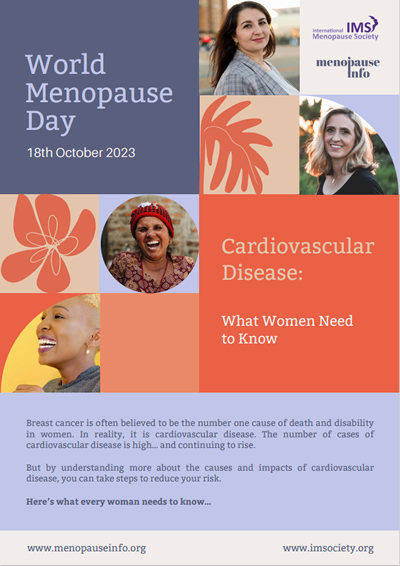
- 8 Things You Can Do To Prevent Heart Disease and Stroke
- About Stroke
- Alcohol
- American Heart Association
- American Stroke Association
- Answers By Heart Fact Sheets: Cardiovascular Conditions
- Aspirin Use To Prevent Cardiovascular Disease US Preventive Services Task Force Recommendation Statement
- BMS TV: Coronary Heart Disease (CHD)
- COVID-19 & CVD
- Cardiosmart.org [CardioSmart, American College of Cardiology
- Cardiovascular Diseases (CVDs)
- Cardiovascular Health After Menopause Transition, Pregnancy Disorders, and Other Gynaecologic Conditions: A Consensus Document From European Cardiologists, Gynaecologists, and Endocrinologists
- Cardiovascular Health: Risks & Causes – What To Do Next?
- Cardiovascular Health: Symptoms of Heart Attack & Stroke In Women
- Cardiovascular Heart Disease
- Cardiovascular Heart Disease: What Increases My Risk of Cardiovascular Heart Disease?
- Chagas Disease
- Coronary Heart Disease: Women and Heart Disease
- Diabetes
- Diabetes and Heart Disease
- Different Heart Diseases
- Doctor Appointments: Questions To Ask Your Doctor
- Doing These 8 Things May Greatly Lower Risk for Heart Disease and Stroke
- Family History
- Get Familiar With Signs of A Heart Attack or Stroke
- Getting Serious About Heart Health
- Goredforwomen.org [Go Red for Women, United States]
- Guidance on Menopausal Hormone Therapy
- Healthy Body: Top 10 Healthy Heart Tips
- Healthy Diet
- Healthy Lifestyle
- Healthy Living
- Heart Attack and Stroke Symptoms: Warnings Signs of Heart Attack, Stroke & Cardiac Arrest
- Heart Disease In African American Women
- Heart Disease and Stroke In Women
- Heart Disease: It’s Not Just for Men – Questions To Ask Your Doctor
- High Cholesterol – Causes, Symptoms & Treatments
- Hormone Therapy In Postmenopausal Persons: Primary Prevention of Chronic Conditions
- How To Make Healthy Food and Healthy Lifestyle Choices Now
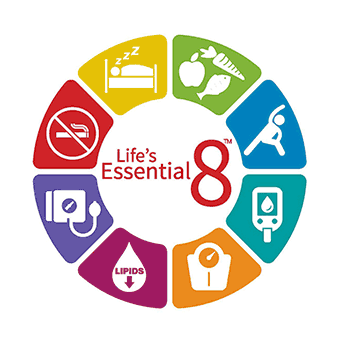 How To Prevent Heart Disease After Menopause
How To Prevent Heart Disease After Menopause- Is It Fatigue – or A Stroke? Women Shouldn’t Ignore These Signs
- Know Your Numbers They Could Just Save Your Life
- Know Your Risk
- Learn & Prevent
- Life’s Essential 8
- Listen To Your Heart: Women and Heart Disease
- Making Mayo’s Recipes: Two Days’ Worth of Heart-Healthy Menus
- Mayo Clinic Q&A Podcast: Tips for Living Younger, Longer By Preventing Disease [+ Video Courtesy: Mayo Clinic News Network]
- Mayo Clinic Q&A Podcast: Understanding the Connection Between Diabetes and Heart Disease [+ Video Courtesy: Mayo Clinic News Network]
- Menopause and Cardiovascular Risk
- Menopause and Heart Disease
- Menopause and Women’s Health
- Menopause and Your Heart
- Million Hearts
- National Center for Complementary and Integrative Health: Cardiovascular Disease
- National Center for Complementary and Integrative Health: Chelation for Coronary Heart Disease: What You Need To Know
- National Center for Complementary and Integrative Health: How Safe Is This Product or Practice?
- OfficialGoRed4Women [Videos]
- Older Adults Could Lower the Risks To Their Heart and Brain 500 Steps At A Time
- People Who Follow These 8 Heart Health Metrics May Live Years Longer
- Preventing Cardiovascular Disease
- Protect Your Heart
- Read My Lips
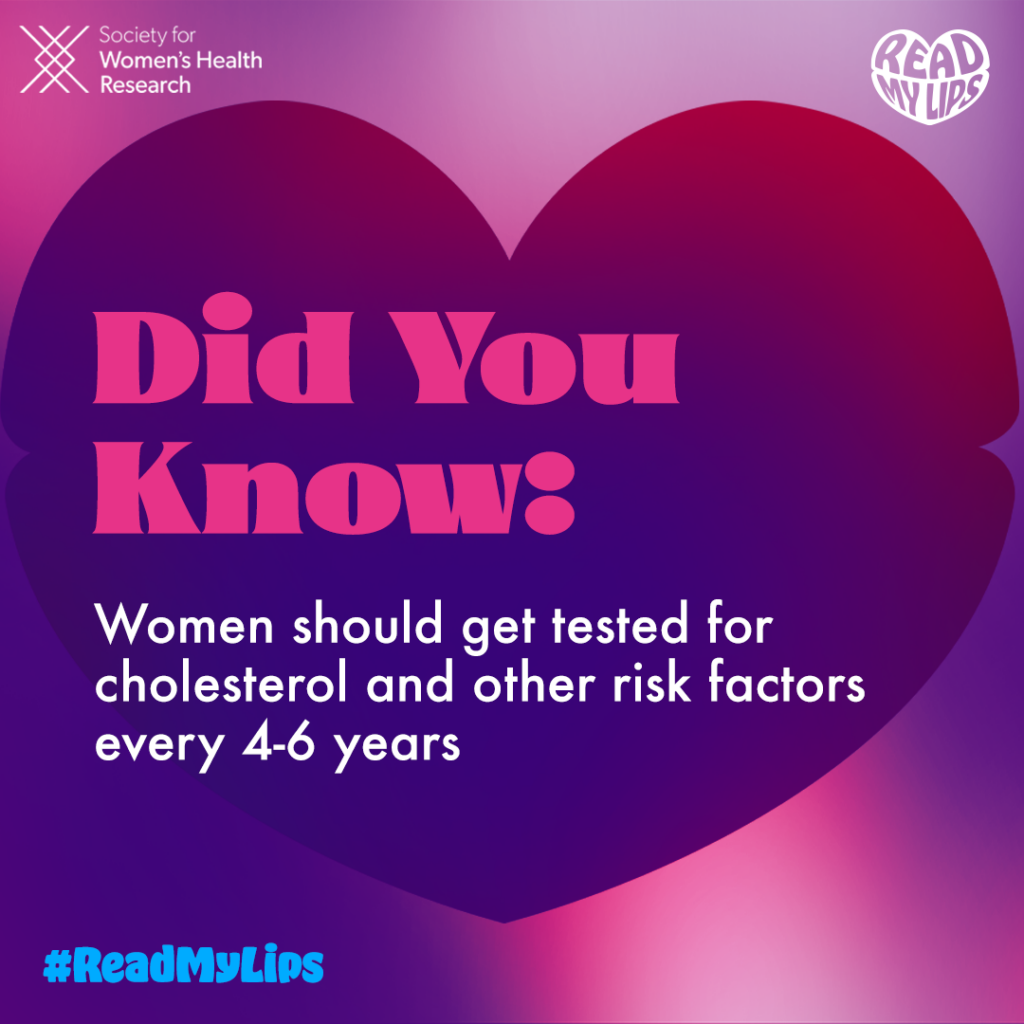
- Real Women
- Recipes [American Heart Association]
- Recipes [National Heart Foundation of Australia]
- Risk Factors
- Staying Active
- Stress and Heart Health
- Stroke
- Stroke Association [United Kingdom]
- Stroke Symptoms
- Stroke – Causes, Signs and Symptoms
- Symptoms of A Heart Attack and Stroke In Women
- Taking It To Heart: Addressing Cardiovascular Disease In Women
- The Connection Between Menopause and Cardiovascular Disease Risks
- Tobacco
- Top 4 Tips To Prevent Chronic Diseases
- Top Health Checks for Women
- US Taskforce Advises Against Low Dose Aspirin for Primary Prevention of Cardiovascular Disease
- Video Series-2023: Menopause and Heart Disease
- Video: Leslie Cho, MD, Discusses CV Risks, Benefits of Menopausal Hormone Therapy
- Videos & Podcasts: Videos – Interviews: Cardiovascular Disease In Women
- WISEWOMAN
- WISEWOMAN: WISEWOMAN Frequently Asked Questions (FAQs)
- Watch, Learn and Live: American Heart Association’s Interactive Cardiovascular Library
- Webinars: Previous – Cardiovascular Disease
- Webinars: Previous – Primary Prevention of Cardiovascular Disease With MHT – Where Are We Now?
- Webinars: Previous – Reproductive Milestones Across the Lifespan and Cardiovascular Disease Risk In Women
- Webinars: Previous – The Heart of the Matter
- What Is A Stroke?
- What Is Cardiovascular Disease?
- What Is Cardiovascular Disease?
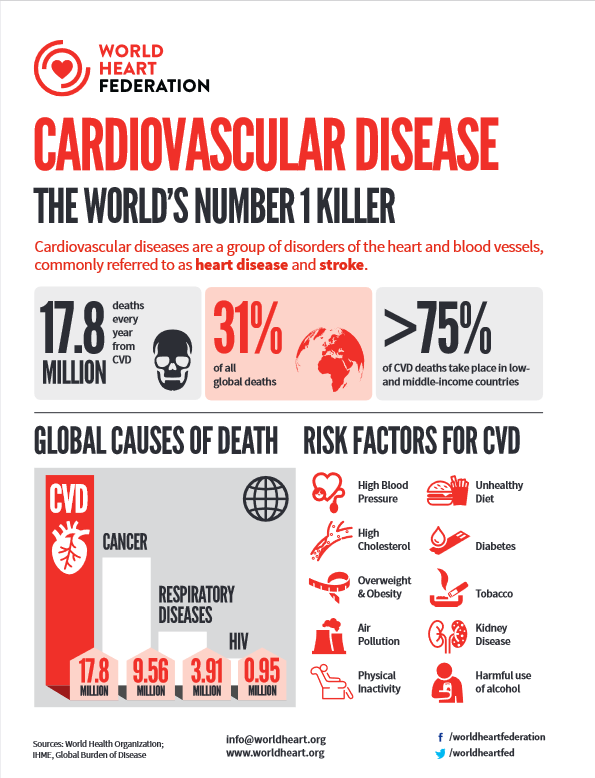
- What Is Cardiovascular Disease? What Can You Do To Lower Your Risk of Cardiovascular Disease?

- What Is Meant By the Term Heart Age?
- Women & CVD
- World Heart Day [29 September]
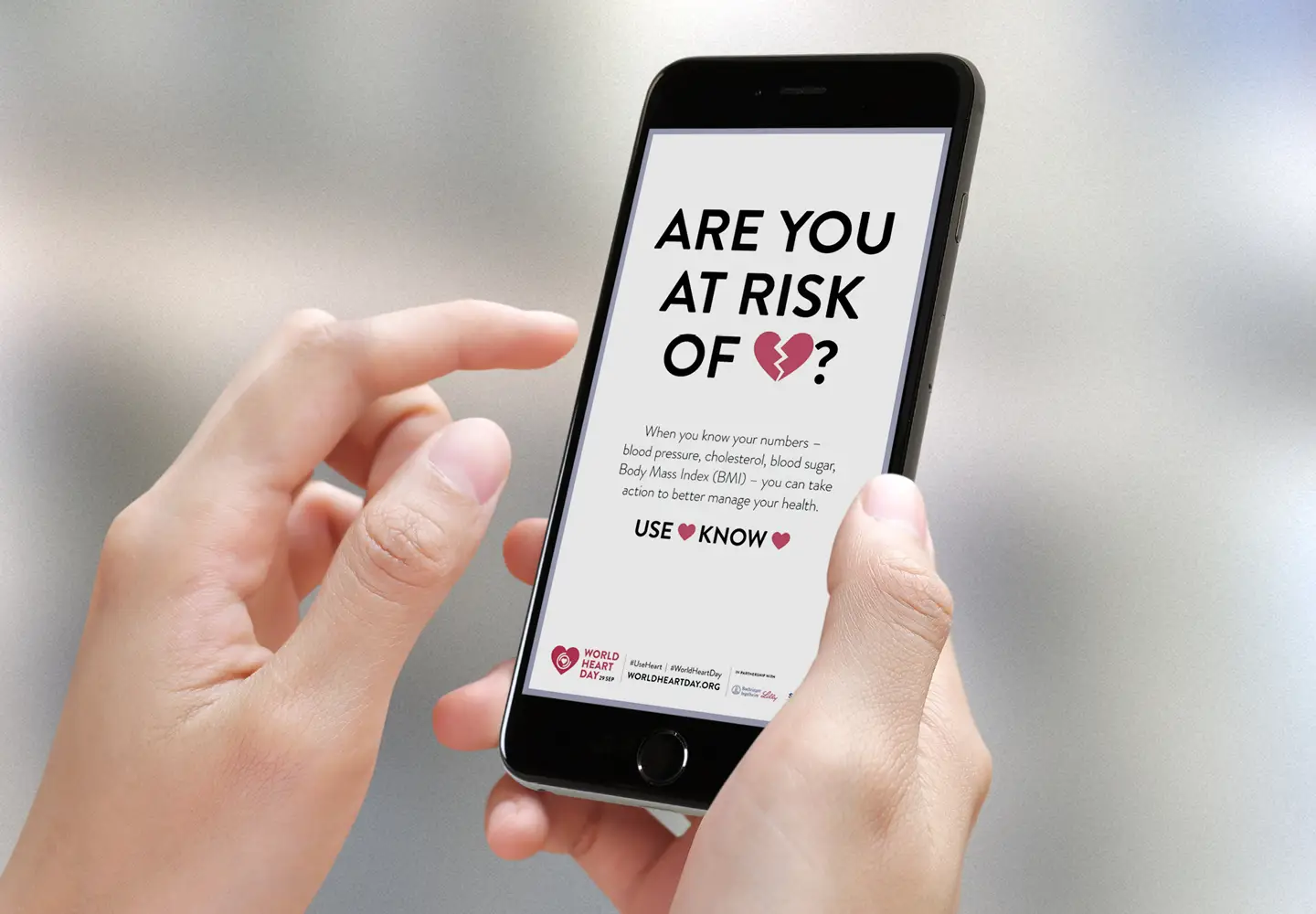
- World Heart Federation
- World Menopause Day [18 October 2023]
- World Stroke Day [29 October]
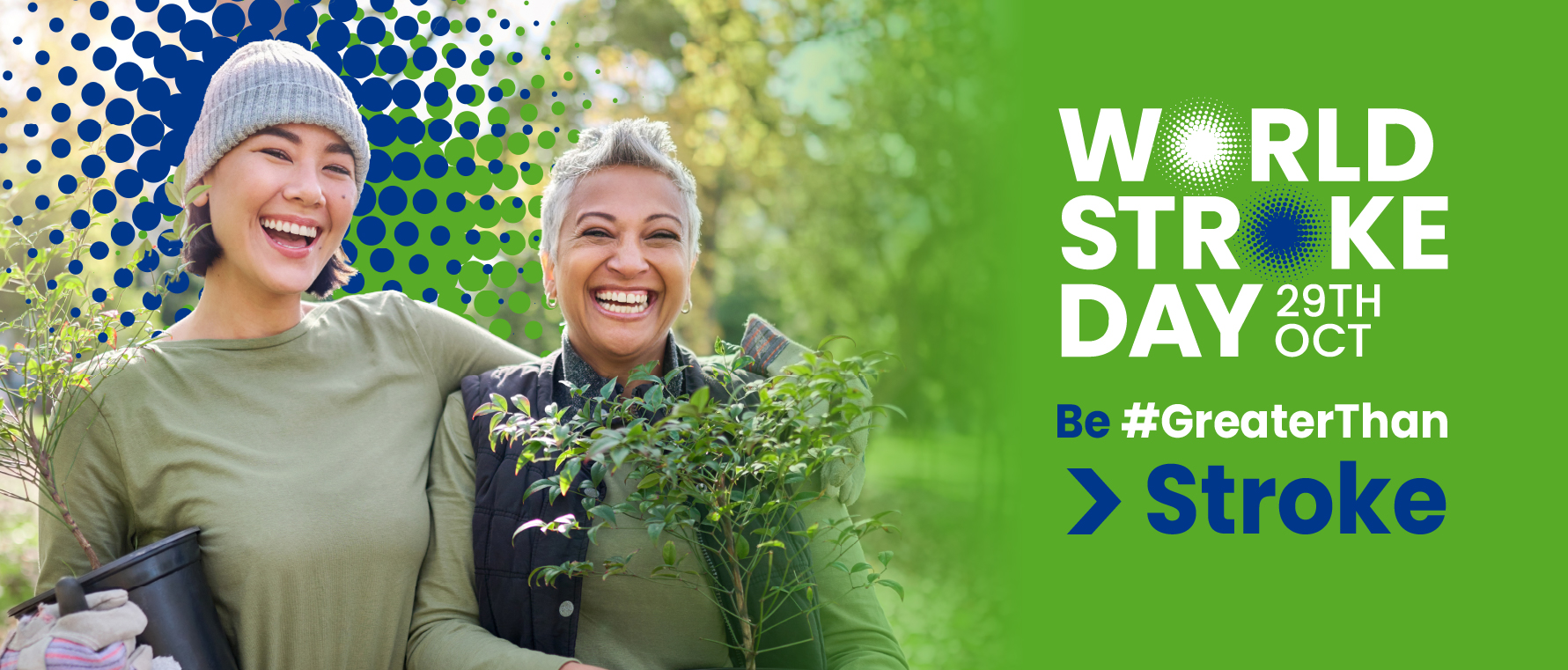
Sources
Where may I find the Sources quoted?
You may find the Sources quoted at:
Sources
- Cardiovascular Heart Disease. Page Last Reviewed: October 2019. British Heart Foundation https://www.bhf.org.uk/informationsupport/conditions/cardiovascular-heart-disease Accessed: 04 October 2023
- Cardiovascular Heart Disease. Page Last Reviewed: October 2019. British Heart Foundation https://www.bhf.org.uk/informationsupport/conditions/cardiovascular-heart-disease Accessed: 04 October 2023
- Cardiovascular Diseases (CVDs): What Are Cardiovascular Diseases? 11 June 21. World Health Organization https://www.who.int/en/news-room/fact-sheets/detail/cardiovascular-diseases-(cvds) Accessed: 04 October 2023
- What Is Menopause? Perimenopause, Menopause and Postmenopause: Postmenopause – Heart Health. Last Updated: 04 September 2023 | Last Reviewed: 19 August 2022. Jean Hailes for Women’s Health https://www.jeanhailes.org.au/health-a-z/menopause/about-menopause Accessed: 04 October 2023
- Menopause FAQs: Your Health After Menopause – Q. Do I have to start worrying about heart disease? North American Menopause Society https://www.menopause.org/for-women/menopause-faqs-your-health-after-menopause Accessed: 04 October 2023
- Cardiovascular Heart Disease: What Increases My Risk of Cardiovascular Diseases? Page Last Reviewed: October 2019. British Heart Foundation https://www.bhf.org.uk/informationsupport/conditions/cardiovascular-heart-disease Accessed: 04 October 2023
- 8 Things You Can Do To Prevent Heart Disease and Stroke. Last Reviewed: 14 March 2019. American Heart Association https://www.heart.org/en/healthy-living/healthy-lifestyle/prevent-heart-disease-and-stroke Accessed: 04 October 2023
- Menopause and Cardiovascular Disease Risk: Does Menopause Increase A Woman’s Risk of Heart Disease and Stroke? Last Reviewed: 27 July 2021. Go Red for Women https://www.goredforwomen.org/en/know-your-risk/menopause/menopause-and-cardiovascular-risk Accessed: 04 October 2023
- WISEWOMAN Frequently Asked Questions (FAQs): What Is the WISEWOMAN Program? Page Last Reviewed: 09 December 2021. Centers for Disease Control and Prevention https://www.cdc.gov/wisewoman/faqs.htm Accessed: 04 October 2023
- WISEWOMAN Frequently Asked Questions (FAQs): What Services Does the WISEWOMAN Program Fund? Page Last Reviewed: 09 December 2021. Centers for Disease Control and Prevention https://www.cdc.gov/wisewoman/faqs.htm Accessed: 04 October 2023
- Know Your Numbers They Could Just Save Your Life. Go Red for Women https://www.goredforwomen.org/en/know-your-risk/know-your-numbers Accessed: 04 October 2023
- Menopause and Cardiovascular Disease Risk. Last Reviewed: 27 July 2021. Go Red for Women https://www.goredforwomen.org/en/know-your-risk/menopause/menopause-and-cardiovascular-risk Accessed: 04 October 2023



